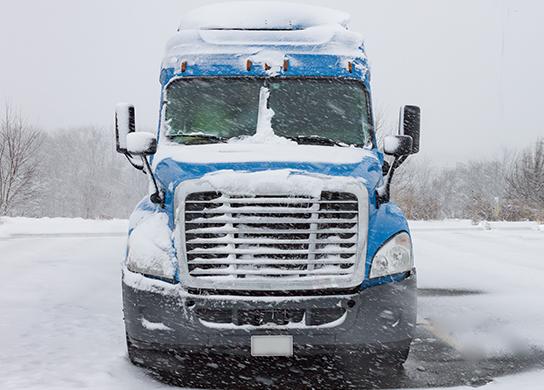Don't Be Left Out in the Cold
January 15, 2020

Winter is here – and while there may be some that think their tires will never touch snow or ice – in recent years, parts of the country that do not typically see cold temps or severe winter conditions have had their fair share of unexpected weather.
Not to fret – being prepared for whatever Ole Man Winter throws your way can be achieved by keeping a few key things in mind.
First, if you are uncomfortable with the conditions don’t drive in it! You are in control of that truck and if the roads are causing you worry – pull over! It’s not worth the risk of putting yourself or others in harms way.
Breakdowns in the winter can be downright dangerous – be prepared with warm clothing, gloves, a pair of good sturdy boots, extra blankets, batteries, first aid kit, nonperishable food-like peanut butter or power bars, and water – enough to sustain you for a few days if you are stranded. Also keep a small shovel on hand, flares and a battery powered radio. Keep a candle and matches or a lighter in your truck along with a metal coffee cup or tin. This can provide a source of heat and light should you not be able to run your truck.
In addition to what to keep in your truck you should also make sure to check the following:
Battery: Cold weather drains batteries fast. Check the age and strength of your battery if you haven’t already. Nothing worse then waking up on a chilly day and having no power.
Fuel additives: Every driver knows that diesel fuel can gel in extreme cold, but not everyone knows why. It’s due to paraffin, a hydrocarbon found in diesel. Paraffin crystallizes in freezing temperatures, allowing any water in the fuel to emulsify and turn the diesel to slush. The solution is to use winter blend fuel with a high cetane rating and add anti-gel additives from trusted companies like Howes, FPP, Lucas and Power Service found at most travel centers throughout the country.
Cooling systems: Yes, you must worry about cooling systems in cold weather. A comprehensive winterization check should include inspections of the radiator, belts and hoses for potential failures. Also, check the coolant to see if it’s at the optimum freeze point.
Fuel filter and water separator: Monitor the truck’s water separator daily and drain it when full to avoid contamination. Replacing old fuel filters also protects the engine.
Air dryer: The air dryer prevents water from entering the brake lines where it can freeze. Make sure it works and change the filter if needed.
Engine block heater: Since diesel engines require a higher cylinder temperature than gasoline vehicles, they are harder to start in the winter. Drivers who travel a lot through the coldest parts of the country should consider an electric engine block heater to use when the truck is parked for long periods of time.
Tire pressure: Cold weather can cause underinflated tires, which wear faster and hurt fuel mileage. Adjust the inflation accordingly.
Windshield wiper blades: Driving in rain or heavy snow conditions can make your life a whole lot harder. Check your wiper blades and make sure they are in good condition to handle the winter weather. It is also a good idea to carry an extra set. Make sure your washer fluid is also filled and ready to go.
Of course, the best course of action to survive the winter months is to use common sense – stay a safe distance from those ahead of you, be aware of changing road conditions and temperatures and if it doesn’t feel safe to drive on the road - it probably isn’t. So be safe out there and don’t be left out in the cold!
